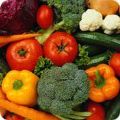|
When SparkPeople member HOLLYSTORMCLOUD became a vegetarian nearly 10 years ago, she simply replaced meat with processed meat substitutes and made no other changes, continuing to consume vast quantities of cheese, butter and pasta. Then, she says, "When I finally decided to do vegetarianism correctly and stop eating so much garbage, I began to slowly lose some weight." Over the next 10 years she lost about 10 pounds, but it wasn't until she made the decision to clean up her diet even more that she saw significant weight changes. While it may come as a surprise to those who equate vegetarians or vegans with a thin yogi body, those who elect to eliminate meat from their diet share the same struggles of losing weight. In the end, it is all about the amount and the types of foods you eat, as well as how much you exercise, that ultimately leads to an all-over healthy lifestyle. "Eliminating one or more food groups isn't going to cut it. SparkPeople member APPLERM sums it up best, recalling how she became a vegetarian about 17 years ago, and did drop a few pounds initially. Then, she says, "I realized Doritos do not have meat in them." When losing weight as a vegetarian or vegan, it's not so much about what you give up but about what foods you include in your diet that makes you successful. What to Include When You Want to Lose"A vegan or vegetarian diet does not automatically mean a healthy diet," Megan Roosevelt, registered dietitian nutritionist and founder of Healthy Grocery Girl, says. "Technically a vegan diet is one that avoids animal foods. However, there a plenty of vegan foods that are not healthy, such as desserts or processed snack foods. A plant-based vegan diet is ideal for an individual with weight-loss goals. This type of diet is based in real, whole foods that are nutrient dense while also avoiding animal foods." "The amount of protein, carbs and calories each person needs per day will vary based on many factors including height, weight, activity level, health status and health goals or needs. The average sedentary female needs about 46 grams of protein per day, while a sedentary male typically needs 56 grams of protein. While it may seem difficult to consume adequate protein solely from a plant-based diet, it is actually easily attainable!" Roosevelt explains. "For weight-loss goals it's important to consume a diet that you find enjoyable, satisfying and nutrient dense. When wanting to lose weight, I recommend focusing on quality of foods first, versus quantity." To safely and effectively lose weight on a vegetarian or vegan diet, registered dietitian Stephanie Dunne recommends making sure to include the following steps: 1. Drink plenty of water. Proper hydration helps our bodies clean out toxins and waste effectively. 2. Eat plenty of fiber. It is essential for feeding our good gut bugs (our microbiota) and to enable daily bowel movements which are essential for carrying toxins and waste out of the body. The best sources of fiber are whole vegetables, fruits, beans and legumes. 3. Consume plenty of protein. For vegetarians and vegans, consuming beans, legumes, nuts and seeds provides lots of protein. Many vegetables have some protein in them, as well. It may be necessary to include an appropriate, plant-based protein powder to get enough protein in one day if you are coming up short or engaging in high-intensity activities. SparkPeople member JLEFAE struggles with getting enough protein without the fat. She became a vegetarian 30 years ago due to health issues, only to discover giving up meat wasn't enough. "Although my general health initially improved, I actually gained a lot of weight the first couple of years because I didn't know how to do it right. Since then my weight has gone up and down. The biggest challenge for me seems to be eating enough protein without adding a lot of fat, and getting plenty of exercise," she says. 4. Eating enough healthy fat. Good fats ensure proper absorption and utilization of fat-soluble vitamins. Ideal sources of healthy fats include avocado, olives or olive oil, nuts and seeds. 5. Remove foods that cause you any sensitivity. Some foods cause inflammation and can contribute to weight gain. Common food sensitivities include gluten, dairy, corn, eggs and soy. 6. Taking supplements. You may need a B12 supplement, as this vitamin is only found naturally in animal-based foods. Getting enough B12 is essential to convert the food we eat into energy. It's also needed to create healthy blood cells and to protect our nerves. Health and wellness coach Nathane Jackson also notes that, "It is wise to monitor other nutrients such as iron, zinc, calcium and the omega-3s DHA and EPA, as these can become deficient if you're not careful."
|
(002).jpg)





